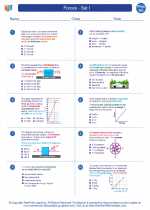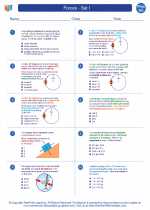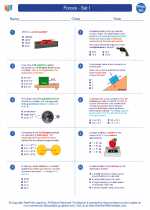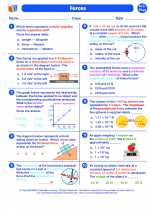Life Cycle Explanation and Study Guide
Explanation:
The life cycle refers to the stages through which a living organism passes from the beginning of its existence to its end. This concept is applicable to all living organisms, including plants, animals, and even single-celled organisms.
Stages of the Life Cycle:
The life cycle typically consists of the following stages:
- Birth or Germination: This is the starting point of the life cycle, where a new organism is formed either through birth or germination from a seed or spore.
- Growth and Development: After the initial stage, the organism undergoes a period of growth and development, where it matures and reaches its adult form.
- Reproduction: The mature organism reproduces, ensuring the continuity of its species by producing offspring.
- Aging: As the organism grows older, it may start to show signs of aging and eventually reaches the end of its life cycle.
- Death: The final stage of the life cycle, where the organism ceases to function and eventually decomposes, returning its nutrients to the environment.
Variations in Life Cycles:
While the basic stages of the life cycle are common to all organisms, there are variations in the duration and specific processes involved in each stage. For example, some organisms have a short life cycle, completing all stages in a matter of days, while others may have a much longer life cycle spanning several years.
Study Guide:
Key Concepts:
- Understanding the stages of the life cycle
- Recognizing the variations in life cycles among different organisms
- Exploring the significance of reproduction in the life cycle
- Considering the impact of environmental factors on life cycles
Study Tips:
- Make use of visual aids such as diagrams and charts to illustrate different life cycles
- Compare and contrast the life cycles of various organisms to identify commonalities and differences
- Research specific examples of life cycles in plants, animals, and microorganisms to gain a comprehensive understanding
- Discuss the importance of life cycles in ecological systems and the balance of ecosystems
Practice Questions:
- What are the main stages of the life cycle?
- How do environmental factors influence the life cycle of organisms?
- Provide examples of organisms with different life cycle durations.
- Explain the significance of reproduction in the life cycle.
By thoroughly understanding the life cycle and its variations, you will gain valuable insights into the processes that govern the existence of all living organisms.
[Life Cycle] Related Worksheets and Study Guides:
.◂Physics Worksheets and Study Guides High School. Forces - Set I

 Worksheet/Answer key
Worksheet/Answer key
 Worksheet/Answer key
Worksheet/Answer key
 Worksheet/Answer key
Worksheet/Answer key
